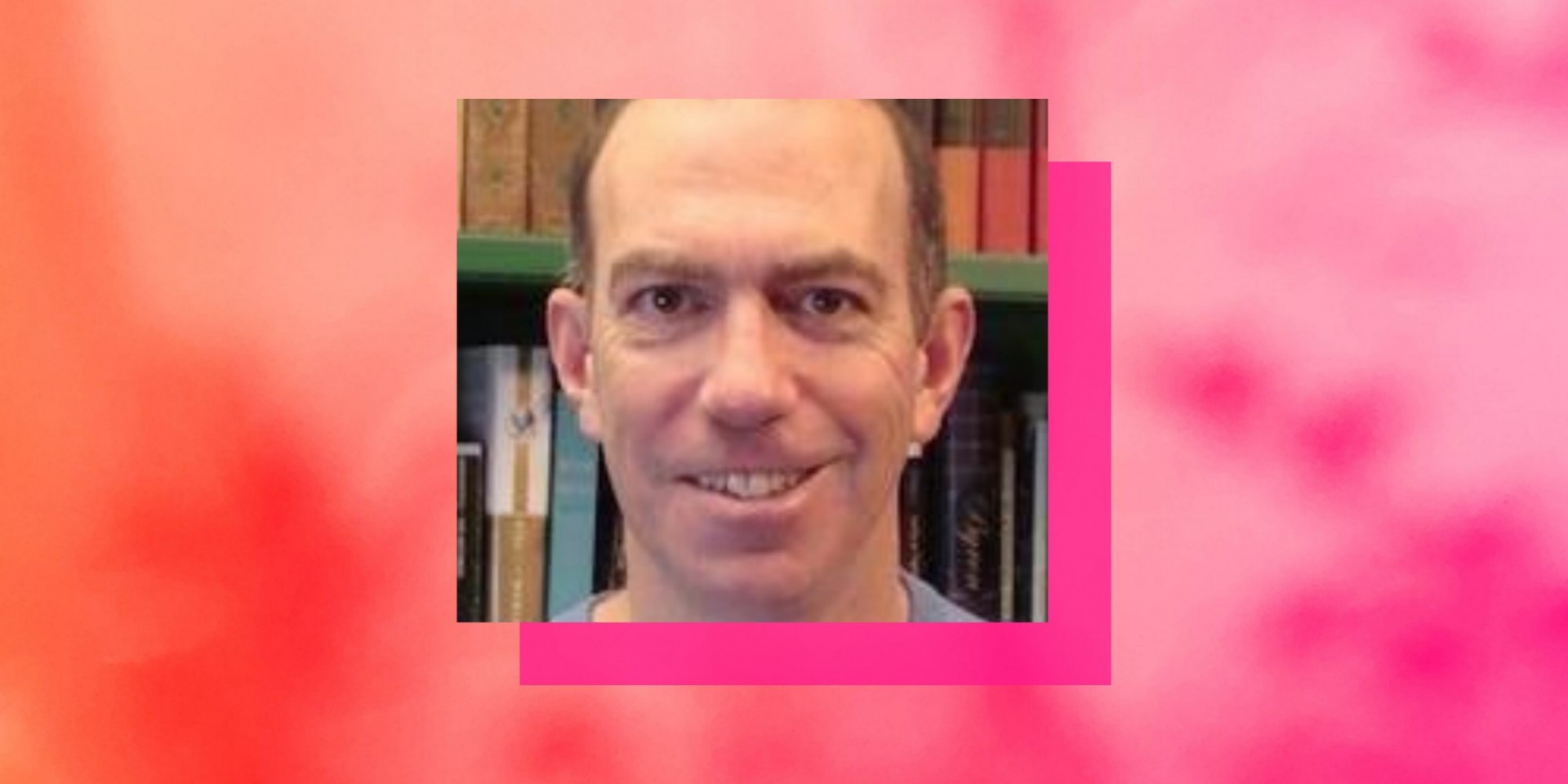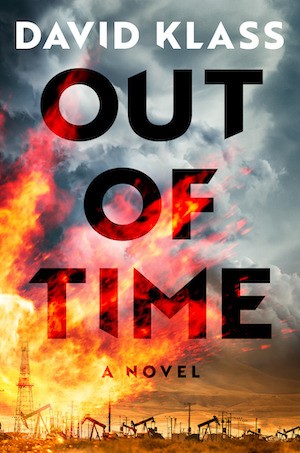This Is Who We Are: David Klass
This Is Who We Are is a series featuring Columbia School of the Arts’ professors, covering careers, pedagogy, and art-making during a pandemic. Here, we talk with Assistant Professor of Professional Practice in Film and Theatre David Klass about the recent Netflix adaptation of his thriller novel Out of Time, what inspires him to write, and how COVID-19 has affected his teaching.
Last summer, when the world was largely shut down in response to the COVID-19 pandemic, Assistant Professor David Klass continued with the routine that has been the backbone of his writing practice for years: getting up before most people do to accomplish several hours of work.
"I'm extremely disciplined as a writer,” Klass says. “I get up every morning at about 4:30 or 5 am, and I write for about two to three hours before everyone wakes up. My two children who are teenagers, or even a little older than that, are home, but luckily nobody is crazy enough to get up that early. So during this pandemic, one of the things that's really kept me sane during this year, is this routine, of getting up every morning, knowing that my family is here but they're all blissfully asleep…And during the summer, it was adapting Out of Time into a screenplay, working on it every morning, reliving the writing process, revisiting the characters, and it was such a joy, really."
Out of Time is Klass’s 20th novel, and one he almost didn’t write. "I had gotten up to 19, and I had stopped writing novels. I'd stopped for about five years when my agent, Aaron [Priest] took me out to lunch and he said 'When are you going to write another novel, it's been five years.' And I said to him, 'You know Aaron, my mother who was a writer, got up to 19 before she died, and I'm at 19, so out of respect for my mother, to honor her memory, I don't think I'm going to write another one.' And Aaron said, 'I knew your mother, and she would have wanted you to write 20.' And that was really true, so I came home that night, and I decided to try to write one more book. And for the most part, I had written in the young adult space, which I love, but to be honest with you, I had already written maybe 16 young adult books, and I used up every adolescent experience I'd ever had. And sometimes I felt like I was recycling the same ball game or date or whatever for the third time. So I decided that if I was going to write one more book, maybe I should try to write an adult book.”
In Out of Time, a cunning serial bomber and so-called “eco-terrorist” strikes his sixth target, taking the lives of 12 innocent people. The bomber claims that his attacks, which destroy targets that threaten the environment, will force the world to acknowledge the climate-change crisis, and a young FBI agent may be the only person with the skills to stop him.
"Sometimes when you write a book you can't tell where the book came from,” Klass says. “But in this case, there were two really clear inspirations. One of them is I have a daughter who's now a senior in high school and a climate activist. She brought me to a rally outside the UN when Greta Thunberg came to America. So I was standing with the adults and she was with the activists, young activists, and I found the whole thing fascinating—their passion, but especially their anger, toward us, and the feeling that we had betrayed their generation, and that we were giving them a world that was really not just in danger, but possibly doomed, and how dare we do that.”
Klass continues, “And then secondly, almost 20 years ago, I had written an environmental young adult novel called California Blue. When I was researching California Blue, I needed to describe a radical environmental group, and I was living in LA, so I found a radical environmental group that was driving up to Northern California and doing things that were illegal in the name of environmental activism. I asked them if I could sit in on some of their meetings, and they were suspicious, they vetted me to see if I was with the FBI, but finally they let me sit in on some of their meetings. I was confused, morally, because I was brought up to believe that anything illegal, anything that harms people, anything that has anything to do with terrorism, is wrong. And I believe that really strongly. I lost a friend in 9/11, so I really believe that. But on the other hand, these were very sort of gentle thoughtful people who believed that what they were doing was necessary to save the earth. That memory stayed with me 20 years, and so that night I somehow combined that memory of the youth march outside the UN with those people I had met 20 years ago, and that was really the inspiration for the novel."
After Klass wrote the first 150 pages of the novel, it was sold to Penguin Random House’s Dutton branch. Klass submitted the project to his five dream Hollywood producers, one of whom was Liza Chasin, whose productions include Atonement and Bridget Jones’s Diary. Chasin read Out of Time and presented it to Netflix.
“We talked about whether it was a TV show or a movie, and these days that's a very difficult determination to make,” Klass says, “I teach TV writing, I frequently can't tell, no one can, because the traditional lines are being blurred. But this book felt very circumscribed, it had a clear beginning and a clear ending, and so Liza and I both agreed that it was probably more of a movie.”
With the Netflix deal in place, Klass set out to adapt Out of Time into a screenplay. "One of the tricks of adapting your own novel is that you fall in love with it,” Klass continues. “Because it's written as a novel, you fall in love with the subplots, and the minor characters, and even some of the bad dialogue that's not dramatic. And then if I was adapting somebody else's novel, I would be much freer to cut things out, to say that'll never work, that's bad dramatic dialogue, it might be good novelistic dialogue, but it's really bad dramatic dialogue, or that storyline, that subplot, is fun in the novel, but there's no space for it in a movie."
Like every major Hollywood studio, Netflix puts many books, plays, and script ideas into active development before deciding whether to make the projects into films. “There is no guarantee that they will make my script Out of Time into a movie. I wrote them the best screenplay that I could. I hope they do, but it’s always a difficult decision.”
When he’s not at work on his novels or screenplays, Klass also teaches in Columbia’s Film and Theatre programs. He is the Co-head of the Television Writing Concentration and currently teaches a TV writing course. Klass, like so many professors this year, has moved his classroom to Zoom, which posed some drastic challenges for his teaching routine.
"I'm a complete luddite,” Klass says. “I hate technology, and I fear it, so this has challenged me on every possible level. But I'm so proud of our students, you know, really, it's been such a hard year, and the commitment that they've brought, and the work that they've done, and how they've been able to put up with me as I've slowly mastered Zoom. In some ways, the combined isolation of the pandemic, while I think very damaging to a lot of other fields, creates the space for writers where some very good writing is done. I think writing is done often in a kind of isolation, and this has unfortunately created that space, but boy do I hope it ends soon."
Klass encourages his students to draw craft inspiration from a range of disciplines. “When I studied TV, the first thing the teacher taught us many years ago, was if you do other kinds of writing, screenwriting, novel writing, forget everything you know, because TV writing is completely different. At Columbia, I've taken exactly the opposite approach: everything you know about writing, about character, about three-act structure [can be applied]. We're lucky enough in the TV program to have Theatre students, we have ten playwrights a year taking our TV writing classes, and they're wonderful with dialogue, but they've also really studied three-act structure, and they add so much to the class. So I think really what I try to say to our writing students is everything about writing that you've done before you came to Columbia—novels, plays, screenplays—are not siloed off. You can use it in your TV writing."
Above all, Klass says, it’s critical for writers to be truly invested in their work. “"My advice to writers, and it's not sort of unique advice, but I really believe it, is that if you care about the material, and especially for novels, if you care about the characters, and in this case in Out of Time, I really really cared about the material, and I had such a deep feeling for my two main characters, that when I wrote the last chapter I almost fell into a depression because I was enjoying spending such time with them, if you care about the material and you care about the characters, it will come through. If you try to write something that's completely artificial, it's much harder to do. I speak as somebody who's written many many bad action movies for Hollywood. So I've done that, you know, but if there's at least a part of it that you can really embrace on a deep level and make your own, it will come through and lift the writing."
Klass has written feature screenplays for all of the major studios. He is the writer of Kiss the Girls starring Morgan Freeman, Desperate Measures starring Michael Keaton, Walking Tall starring The Rock, and most recently, Emperor starring Tommy Lee Jones, among many others. Klass’s TV credits include the Showtime film In the Time of the Butterflies (starring Salma Hayak, based on the novel by Julia Alvarez) and the ABC TV Movie Runaway Virus (based on a Malcom Gladwell article). Additionally, he has worked as a writer and producer on Law & Order: Criminal Intent. Klass has also developed numerous shows for the networks, including the medical drama Austen’s Razor (developed by CBS in 2014, ABC in 2015). He is the author of You Don’t Know Me (Farrar Straus Giroux), which was published in 15 languages, and Firestorm (FSG), which was optioned by Warner Bros. and became the first novel ever endorsed by Greenpeace.
Read more from the "This is Who We Are" series

